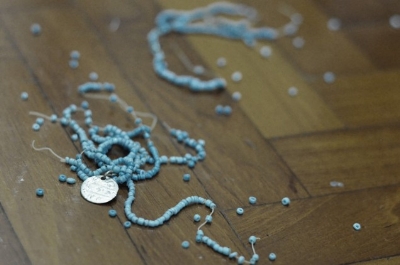
Myriads of abuse tales have recently taken the world by storm. Sexual and physical abuse have left no part of society—even the frum world—untouched by their ugly hands. Although my story starts there, I believe it turns a corner that may offer a unique perspective.
My father abused me and my siblings when we were kids. Heavy, physical abuse. There, I said it. I was actually a good kid, made excellent grades, was respectful to adults, and got along reasonably well with my siblings. And in truth, that did protect me from more serious punishments. My abuse paled in comparison to my older brothers who behaved more “unruly”. Most memories I have of those events are actually the abuse I witnessed unleashed on them, rather than what I myself endured.
I have one vivid memory of when I bought a small bracelet for myself, with my own little savings, and was wearing it for the first time. Sitting on the couch, my father came over without warning and raised a heavy book to hit me for some infraction I must have done. I raised my arm reflexively, and the book slammed down on the bracelet, breaking it. I cried terribly in my room. Not for the pain in my arm, but for the loss of the one nice thing that I could not afford to re-buy. It was a violent home, it was a poor home, and it was bitter.
In that backdrop, I experienced another string of incidences that should never happen to anyone. I was molested, many times…by my brother. No, it was not violent, and I used to think that maybe it was mutual…but there really can’t be anything “mutual” when I was 6 and he was 15, right? I don’t remember how long it lasted—months, for sure. I hope not years. I remember escaping to the bathroom after an episode, when the rest of the house was asleep, and washing my mouth out with a bar of soap, trying to wash away the shame. The bitter taste of soap was welcome, cleansing in my mind. I didn’t understand it—not what it all really meant—but I knew it was secret, it was dirty, and it didn’t make me feel good.
How did all this affect me? How does childhood trauma affect anyone? The real answer is that it affects everyone completely differently. Studies show that a multitude of factors predispose some, and not others, to Posttraumatic Stress Disorder and other lasting consequences, after experiencing trauma. Meaning, there are people who are able to move past it, not let it majorly impact their lives and their future, and can isolate the experiences for what they were—terrible, but not defining. That was my reaction. I was fortunate to have opportunities to remove myself from the situation as a teenager, create healthy relationships with mentors, and see success and happiness in school, in work, and eventually in my family life. The flag of victimhood was never one I waved, nor was it a heavy curtain weighing me down from being the person I wanted to be.
As a young adult, I forgave my father, knowing he had an undiagnosed mental illness, and I also forgave my brother, for he too suffered and lacked the help he needed. In reality, it didn’t make a difference how culpable they were or were not for their actions. I needed to have the life I wished for myself, and I couldn’t let a few childhood years of my life dictate the majority of the rest.
I know the immediate reaction many may have to this: ‘So what? Good for you, but others are not so lucky—what’s the point?’ Some may even find what I wrote demeaning and trivializing to those who have had an impossible time moving past similar or worse traumas. In truth, this reaction is the reason I didn’t even want to write about my past, but let me respond with the following:
My experience, like anyone else’s, is valid. It’s part of the spectrum of human reactions that should not be dismissed simply because it doesn’t fit a narrative. It should not be inherently attacked because of what others interpret it to insinuate. Because it doesn’t. It does NOT mean that others need to “get over it” and move on, and if they don’t, they are deficient somehow. Not at all. All reactions to trauma are equally valid, and indeed, they all are different. But there is something to strive for here, as well.
Hashem gives us challenges, some seemingly impossible, but all to help us become stronger, healthier, better people. My point is that it’s a nisayon, not a death sentence. It’s not a movement, and it’s not the entirety of the person; it’s a scar. Some have larger ones that are visible to everyone, and some have smaller ones they can hide completely. We all have them. But isn’t it tragic, if not only does the scar become the only defining feature of a person, but one that she feels should be the defining feature of herself? Not everyone is fortunate enough to overcome the lasting pain, but we all need to be striving to. Victimhood isn’t a banner or a virtue, nor is it a symbol of shame. Pain is part of life—but to focus on the blessings, well, that’s everything.
**To contact the author of this article, email rochel@nashimmagazine.com with the subject, “contact I am not my scars”, and your message will be forwarded.